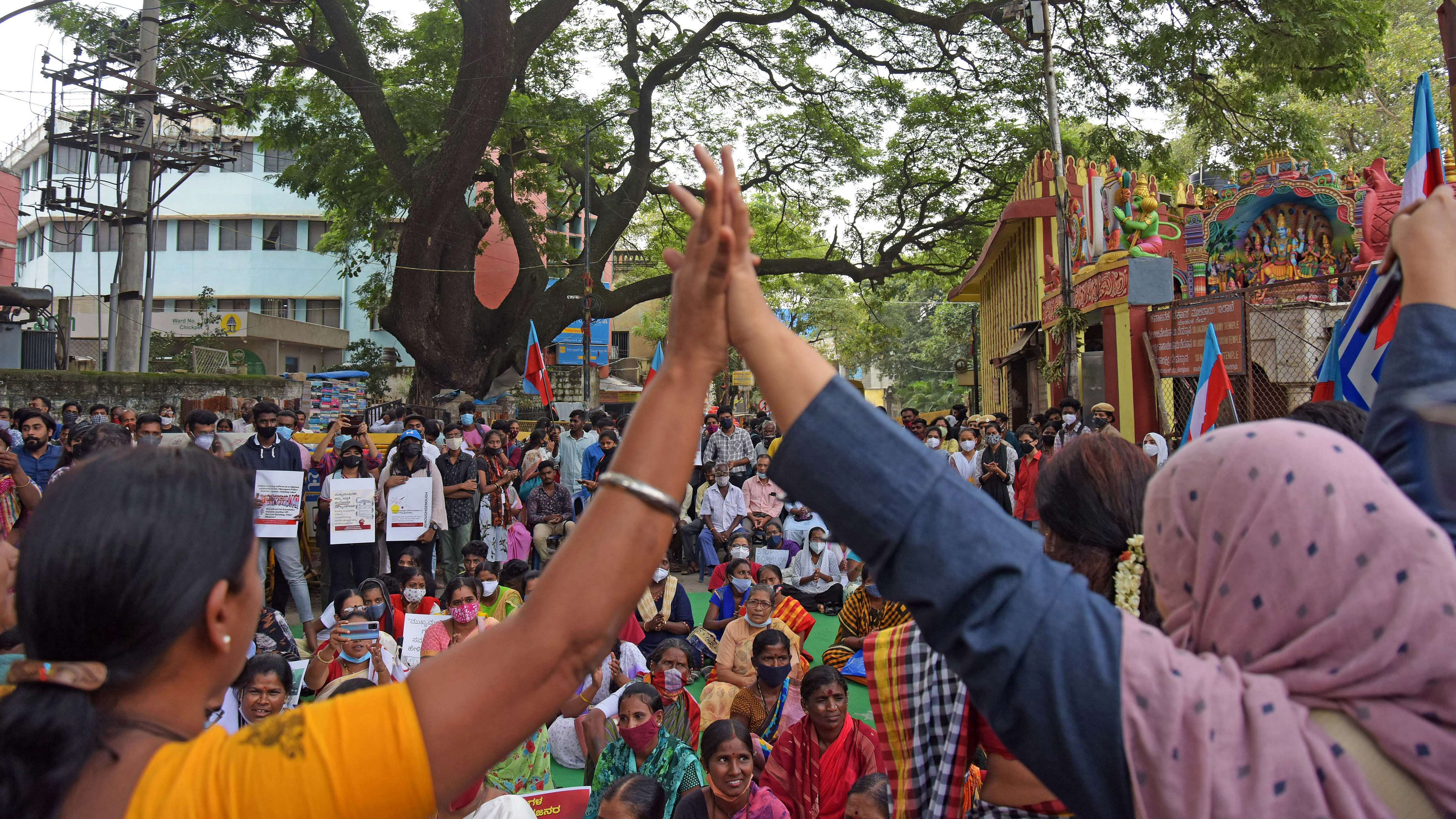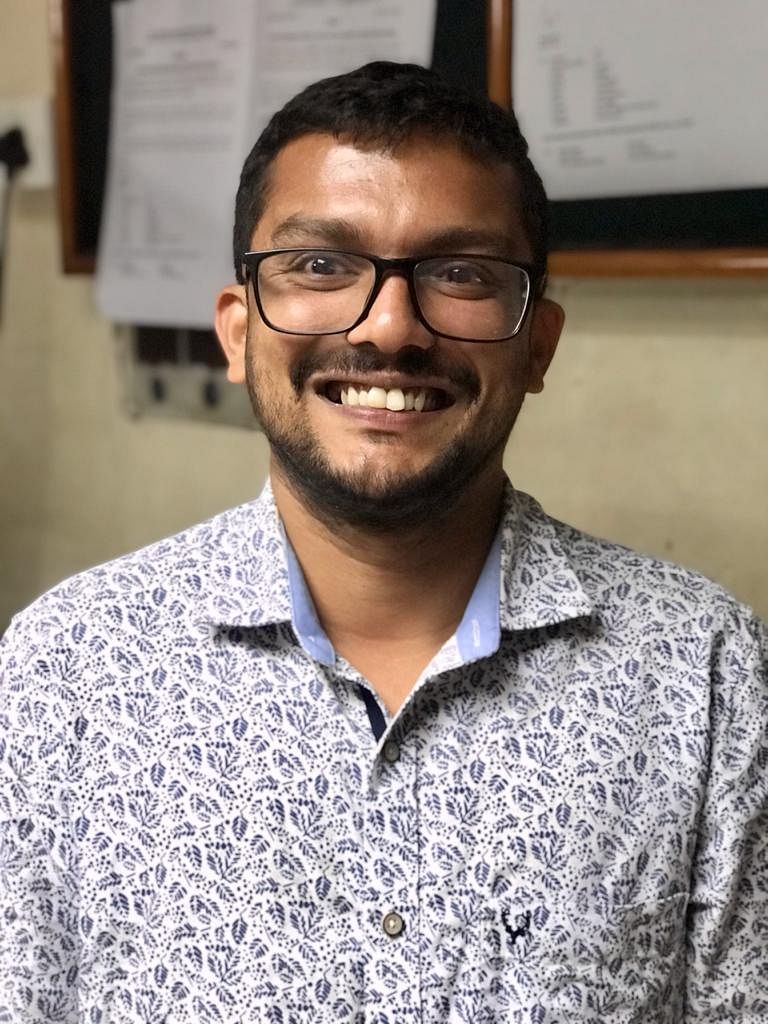
Praveen Valke says he is a reformed man.
Once part of the group that worked to establish the Bajrang Dal in Dakshina Kannada in the noughties, Valke switched over to the Sri Ram Sene before disassociating himself from these groups altogether.
Earlier this month, Praveen Valke put up a post on social media that read “Looking at the atmosphere in Karnataka now, it feels like the election is nearing.”
Valke, like others who have cut ties with right-wing groups on the coast, attributes the recent rise in instances of moral policing and other communal incidents in the district to the next state elections. "I have been in this field for over 30 years. I recognise all the symptoms [of election-related violence]," he said.
"This is just an attempt to hide the governments' failures, a distraction tactic," said Sunil Bajilakeri, another former Bajrang Dal leader.
After a brief lull in recent years, the number of reported communal incidents in Dakshina Kannada has been on an uptick since last year, with 110 cases coming to light last year, and 87 such instances reported till October this year.
Now, this model of communal violence unleashed with elections in mind, which the Sangh Parivar has been experimenting with its ‘Hindutva laboratory’ in the coast, seems to have spread to other districts.
The sharp rise in such instances over the past month, coinciding with Basavaraj Bommai taking over the helm of affairs, has alarmed people.
A few of these cases have grabbed headlines, like the brutal beheading of 24-year-old Arbaaz in Belegavi over his affair with a Hindu girl; incidents of moral policing by Muslim groups in Bengaluru and Belagavi, and by Hindu groups in Surathkal and Moodabidri in Dakshina Kannada district; a clash at Ilkal in Bagalkot district where Muslim students at a coaching institute were attacked for wearing skull caps and open calls for another "Babri masjid-like movement" by Sri Ram Sene founder Pramod Muthalik in Gadag.
Just yesterday, a youth was allegedly murdered for having an affair with a Muslim girl at Almel village in Vijayapura district
And Chief Minister Bommai’s facile remark such incidents being part of an “action and reaction” has not helped things.
Social activist Suresh Bhat Bakrabail, who has documented incidents of communal violence and moral policing for over a decade, said that he feared that incidents of majoritarian extremism will worsen as long as the BJP and RSS are on ascendancy.
Bhat said the 'action and reaction' response by CM Bommai was shocking, coming as it did from the head of a state.
"He has taken an oath on the constitution to protect all people of the state irrespective of all caste and religion."
Several political observers and activists have remarked that this sectarian strife, largely confined to coastal Karnataka and parts of Belagavi, has made steady inroads in other parts of the state.
In 2017, a rally by the Sri Ram Sene in Yadgir saw Telangana BJP MLA T Raja Singh urging locals to keep weapons at home. "Every Hindu has to keep a sword at home to transform India to a Hindu Rashtra," he announced during a highly provocative speech, as the gathered audience cheered in approval.
Last Friday, Tumakuru witnessed a bandh protesting an alleged attack on Bajrang Dal workers.
Activists say that such large rallies rife with communal messages not only help these groups propagate hate, but also turn the fringe mainstream, as was done in Dakshina Kannada.
Gangolli incident
The small town of Gangolli, nestled near an estuary created by the Panchagangavathi river, is one of the largest fishing villages in the state.
On October 1, the town witnessed a rally by Hindutva groups, who went around town chanting derogatory slogans against the Prophet and the Muslim community, in response to a video of cow slaughter that allegedly took place in the region.
The investigation later revealed that the video was shot close to a decade ago, during Bakrid in 2011.
A miscreant lifted the video from an old phone at a repair shop, circulated it widely and mobilised a protest.
Gangolli is no stranger to communal incidents but what irked the Muslim community was that three or four Mogaveera fisherwomen — who mostly sell to Muslim customers — took the lead in the offensive sloganeering.
Incensed, the Muslims announced a boycott of the entire market of 40 fisherwomen.
The viral video and protest are the latest ploy to rouse communal sentiments — something that the town has witnessed for decades, observed Haneef, a resident.
Kamala Kharvi, who heads the Gangolli Grama Panchayat Fish Market, admits that the incident hurt their business along with their sentiments.
“They are hurt that their God was insulted. We are hurt our God was insulted,” she said.
Both parties now appear ready for a compromise. A few Muslims, wanting bygones to be bygones, filtered back into the market, while women started selling fish door-to-door in Muslim localities.
However, the bitterness of the incident has not worn off.
“They are welcome if they want to continue buying fish from us. It is not an issue if they don’t. We have survived for a year without selling anything during the Covid pandemic,” said Kamala.
The recent bout of communalism has coloured decades-old business ties that had remained immune to religious differences.
Now, it is also straining the relationships among ordinary people and polarising them.
Two actions, two reactions
The way that the police deal with communal incidents is also a source of discontent.
Some 40-km from Gangolli is the Yedadi Mathyadi village.
On October 10, the police accompanied Hindu right-wing groups as they barged into the house of Jyothi, a protestant preacher, and accused her of forceful conversion.
An FIR was filed under IPC sec 153(a) (promoting enmity between different groups) and 295(a) (deliberate and malicious acts, intended to outrage religious feelings).
“Despite my appeals to the police that my mother was alone at home and that I would present myself at the police station the next morning, I was detained during the late hours of the day. My bail too was delayed and I was forced to spend a day at Mangaluru Central jail before my release on October 12,” she said.
Jyothi used to host prayer meetings at her residence for 30-odd people every Sunday, and has now been asked by authorities to discontinue it for a while.
In contrast, Samhitraj and Sandeep Poojary who were accused of moral policing on October 9 at Moodabidri in Dakshina Kannada district, were released on the same day.
Since they were not eligible for station bail due to the IPC sections invoked against them, local police authorities swiftly produced them before a judge via video conferencing, ensuring bail within a few hours of their arrest.
The local BJP MLA Umanath Kotian arrived at the station to ensure that the duo didn’t spend much time in custody.
Economy, anti-incumbency
Political observers such as Shrinivas Karkala argue that minorities are being targeted by Hindu majoritarian groups because the BJP now understands that anti-incumbency is a major issue.
“Government failures are now staring in the face of BJP supporters, forcing them to resort to old tactics involving communal strife,” he said.
The views are also echoed by former Bajrang Dal members who have now parted ways with the right-wing group.
“Poor youth from backward caste communities are the one’s bearing the brunt of this communal adventurism, while the children of those who instigate violence are educated and safe in developed countries,” said Sunil Bajilakeri, a former Bajrang Dal leader.
Locals have eventually come to dread the communal fear-mongering, he claimed.
A case in point is that many members of Hindu right-wing groups from low-income families, arrested for rioting prior to the 2018 elections, are still in jail.
Communal strife has also hampered the economic development of Mangaluru — a city connected with air, rail and ship services. “The city has a very bad reputation that repels investors. What is Mangaluru’s loss has turned out to be Kochi’s gain,” said a government official.
Hate for profit
Sharan Pumpwell is arguably the most prominent Hindutva leader on the coast today.
Not many know that Sharan, who is now Mangaluru divisional secretary of Vishwa Hindu Parishad, also runs the Eshwari Manpower Solutions Ltd, with its office at Mallikatte in Mangaluru.
He provides security to the largest malls in the city — two of which are owned by Muslims.
A top police official told DH that interfaith couples are kept safe inside these malls manned by Sharan’s employees. “Once they step out, members of the same organisation are likely to harass and assault such a couple,” the official quipped.
Recently, the police investigation into the brutal murder of Arbaaz in Khanapur, Belagavi district by members of Sri Ram Sena Hindustan also revealed how the self-declared protectors of Hindus also double as extortionists and contract killers.
Sharan Pumpwell says that it was due to their struggle that issues such as “forced conversion and love jihad” have entered mainstream.
“Christian missionaries are adapting Hindu rituals to fool innocent Hindus into embracing Christianity. Muslim boys, meanwhile, are luring Hindu girls by pretending them to fall in love with them and are then forcing them to convert,” he alleged.
Meanwhile, Social Democratic Party of India state secretary Ashraf Machar opined that the “bogey of conversion” and attempts of communal polarisation was just to keep the majority community on their toes.
“Hindu right wing projects Muslims and Christians as their enemy. They accuse us of the wrongs they commit to depict us in a bad light,” he said.
“Nobody is taking action against the perpetrators. If the Bajrang Dal acts on the basis of preserving Hindutva, then Muslim organisations like the PFI act on the pretext of self-preservation. But acting on self-preservation sometimes leads to violence, and innocent people get hurt,” said Shabbir Ahmad, a social activist based working in Dakshina Kannada district.
Shabbir added that the vitiated atmosphere has also given Muslim groups a pretext to carry out moral policing within their communities, especially in rural areas.
College divide
Instances of moral policing or other attacks against minority communities have soured relationships between students in colleges, observed Father Melwin Pinto, Rector of St Aloysius College, Mangaluru.
“Friendships of students across communities have dwindled. Students feel comfortable grouping with members from their own community,” he said, adding that the language is also a problem.
Attacks on students for mingling with their peers from other religious groups also affected the psyche of students, Melwin said.
Despite such developments, he argues that minorities are safe in India. “But harassing them gives some parties political mileage. That is why religious sentiments are used… In a modern liberal democracy when we choose people to rule us, how can we not choose our partners?” he asked.
